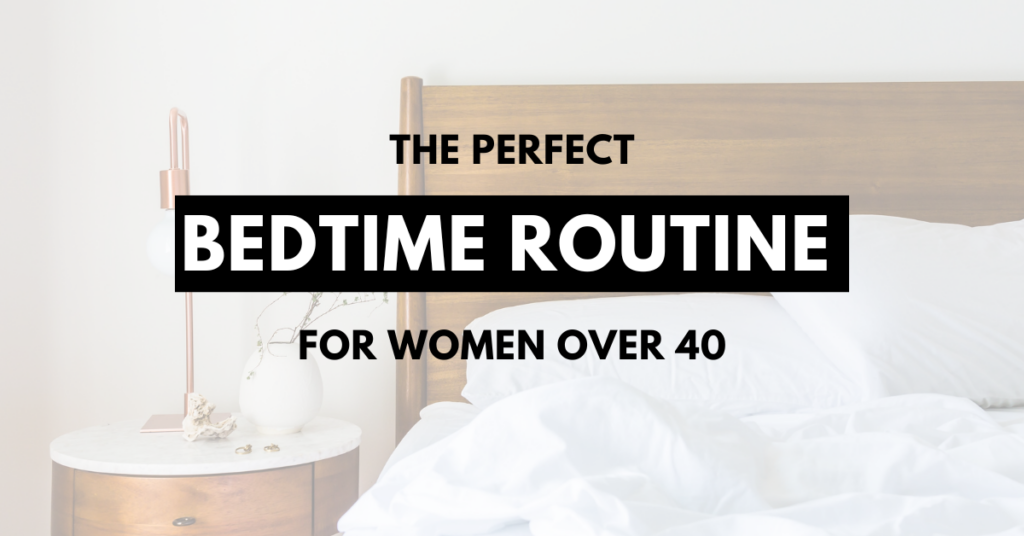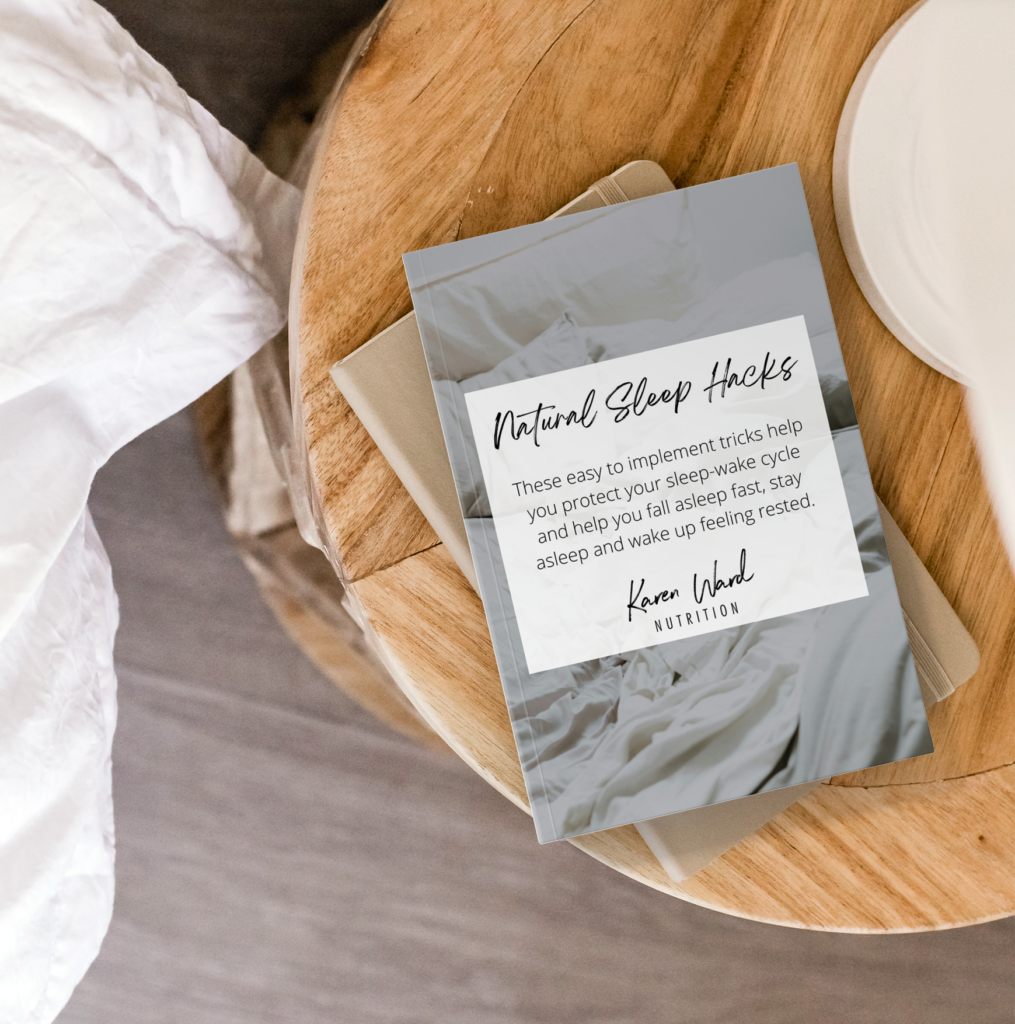
The perfect bedtime routine for women over 40
Read time: 6 minutes
Women over 40 often struggle to get enough good quality sleep due to a variety of factors. The first, and probably most influential, is hormonal changes. These women are starting to experience natural changes in their estrogen and progesterone levels. These hormonal changes can disrupt ideal sleep patterns.
Another hormone that impacts sleep is cortisol, or the stress hormone. Stress and anxiety from life-related pressures can make it difficult to relax and fall asleep. This can also cause women to wake up in the middle of the night and have trouble falling back to sleep.
Lifestyle factors can also contribute to sleep challenges. These factors, which I’ll go into in more detail below, can include: diet, sleep schedules, amount of exercise and aging.
Not being able to get enough good sleep can be infuriating and frustrating, and obviously, exhausting!
The good news is that there are lifestyle interventions that may help. The best way to address sleep difficulties is to use a holistic approach that considers all of these factors. And a great place to start is by upgrading the habits in your bedtime routine. In this post, I’ll provide 5 habits to incorporate into your bedtime routine. I hope this new routine will help you fall asleep fast, stay asleep all night, and wake up feeling like a brand new woman.
The perfect bedtime routine.
The perfect bedtime routine starts ideally 1 hour before you shut your eyes and fall asleep. The actions you take (or don’t take) during this 1 hour window could make or break your body’s ability to sleep well.
Quality sleep is especially crucial for women over 40 as it offers a myriad of benefits that contribute to overall health and well-being. It plays a vital role in hormonal balance, by helping to reduce fluctuations in estrogen and progesterone. Good sleep also enhances cognitive function, memory consolidation, and emotional resilience. These are essential for managing the various challenges that women may face during this time of their life.
Getting enough restorative sleep also supports immune function, cardiovascular health, and metabolism. This reduces the risk of chronic and age-related diseases such as heart disease, diabetes, and obesity. As a bonus, getting enough good sleep every night can delay the aging process by promoting cell repair and regeneration. While asleep, the body is producing collagen which is essential for maintaining a youthful complexion.
So without further ado, I introduce to you: the perfect bedtime routine.
1. Decide when your routine will begin.
Ever since early humanhood, the body has preferred to operate in cycles. In many cases, these cycles are aligned with environmental cycles, such as the sun rising and falling or the lunar cycles. The cycle associated with sleep is the sleep-wake cycle, and depends on the body’s internal clock (or circadian rhythm). And many other biological processes depend on this internal clock to be relatively consistent. Examples include: hormone fluctuations, mood stability, cognitive function, and immune system function.
Having a consistent sleep schedule is incredibly important because it regulates this internal clock, and therefore regulates many other things in the body. In other words, when your body becomes accustomed to your routine, it becomes a lot easier to fall asleep and wake up naturally. The consistency also promotes deeper (aka more restorative) sleep.
Pick a time you’d like to be asleep by, and start your bedtime routine 1 hour before that.
2. Dim the lights.
The first habit in your perfect bedtime routine is to dim the lights. This sends a signal to your brain that it’s time to start winding down. It also resembles the the sun is setting which is evolutionarily when our ancestors retired for the evening. Once the lights start to dim, the cortisol levels in our body also start to decline which prepares the body for sleep mode. This does not happen, however, when the body is in a state of chronic stress. If your body doesn’t naturally start to wind down at your bed time with dimmed lights, then you may need to address your stress levels.
And speaking of light, this is also when you’ll want to turn off all of your screens. Easier said than done, right? If you aren’t ready to cut the cord with your devices for a whole hour before bed, then you can put on your blue light glasses at this time.
3. Organize.
Once the lights are dimmed, take a few minutes to organize your thoughts and space. This will help to keep your brain from racing with ALL THE THINGS right before bed time. Having clutter in your brain or space increases anxiety and makes falling asleep difficult.
Some examples of habits you can do during this time are:
- Make a list of the things you want to accomplish tomorrow
- Spend some time tidying up clutter
- Wash the dishes in the sink
- Put away the folded laundry
- Do a quick brain dump of everything that’s on your mind
These are just some examples to give you some inspiration but you know what would work best for you. You could also skip the chores and spend this time practicing self-care. That might mean being intimate with your partner, or just chillin’ with your family. This could also be the time when you complete your skin care regimen or take a long bath. The ultimate goal here is to get yourself in a state of zen, and not have anything to think about once you climb into bed.
4. Take your supplements.
Most sleep supplements take about 20-30 minutes to kick in so take these during the last half of your bedtime routine window. Natural sleep supplements are not a replacement for sleep, but they can assist with getting the most out of your sleep time.
Aromatherapy or drinking calming herbal teas can also offer a means to unwind. Lavender and chamomile are excellent for inducing a sense of calmness in the body.
Natural sleep aids can offer a restful night’s sleep without relying on pharmaceuticals. These remedies, often derived from naturally occurring substances such as herbs or minerals, tend to have fewer side effects compared to their synthetic counterparts. This makes them a much safer option for long-term use. They may not known you out like the synthetic sleep aids, but they do promote a gentle and non-habit-forming approach to improving sleep quality. This also allows for healthier sleep patterns without the risk of dependency. Many natural sleep aids offer additional benefits such as stress reduction, relaxation, and improved overall well-being. These types of supplements contribute to a holistic approach to sleep management.
Not sure what natural supplements to take? I wrote a whole post about the benefits of supplements for sleep which you can read about here.
5. Finish with a calming activity
After you’ve spent some time organizing your life and have taken your supplements spend the last few minutes of your awake time doing a calming activity. Try as best you can to refrain from looking at a device during this time. Watching TV or playing a game on your phone can be incredibly stimulating to the brain. While you might fall asleep just fine, this stimulation can interfere with your natural sleep pattern and impact deep sleep. The point is to do something that is so relaxing that you might actually fall asleep while doing it.
Here are some ideas for rounding out your bedtime routine with a calming activity:
- Use a clip on book lamp to keep the lights dim and not disturb your partner
- Listen to a guided meditation through an app such as Insight Timer (free), Headspace (free or paid versions) or Calm (free or paid version)
- Use a calming breathing technique such as the 4-7-8 or a diaphragmatic breathing exercise
- Reflect on your day using a daily journal, such as this Ever Strive 1% Better Journal or The Self Care Journal
- Listen to a genre of music that relaxes you (I love listening to classical music using my Manta SOUND Sleep Mask as I drift off to sleep)
In summary...
Sleep plays a fundamental role in allowing the body and mind to rest, recover, and regenerate. It’s not just about feeling rested although that’s usually what everyone wants from sleep. It’s also essential for cognitive function, emotional regulation, immune system functioning, and metabolic processes. Sleep quality is an indicator of health, and sleep itself is a foundational pillar for the rest of our well-being.
Throughout human history, our ancestors lived in environments devoid of modern technology and comforts. They relied on natural cues such as daylight and darkness to regulate their sleep-wake cycles. In this primal setting, sleep served as a crucial survival mechanism, enabling individuals to conserve energy during periods of darkness and remain vigilant to potential threats during the night. Our biology has evolved to synchronize with the natural world but our modern world is full of things that disrupt this connection.
Artificial lighting and digital distractions which are available to us 24/7 can be major disruptors of sleep. The blue lights emitted by electronic devices suppress the production of melatonin, which is the hormone that regulates the sleep-wake cycle. Irregular sleep schedules can also confuse the body’s sleep cycle and make it very difficult to fall asleep at the desired time.
By reflecting on our ancestral relationship with sleep, we can appreciate the intrinsic importance of prioritizing rest and maintaining healthy sleep habits in the modern age, where technological advancements have disrupted our natural sleep patterns and introduced new challenges to achieving optimal sleep health.
What's next?
If you need help getting started with the perfect bedtime routine, my free Natural Sleep Hacks Guide will help you upgrade your evening habits so that you can peacefully drift off to sleep and wake up feeling well rested.
In this guide, you’ll learn easy to implement tricks to help you protect your sleep-wake cycle, and fall asleep fast, stay asleep, and wake up feeling rested.
Enter your email below to download now.
By entering your email, you’ll also be subscribed to my email list where I share loads of holistic health and nutrition content and personal stories that you won’t find on my website.

